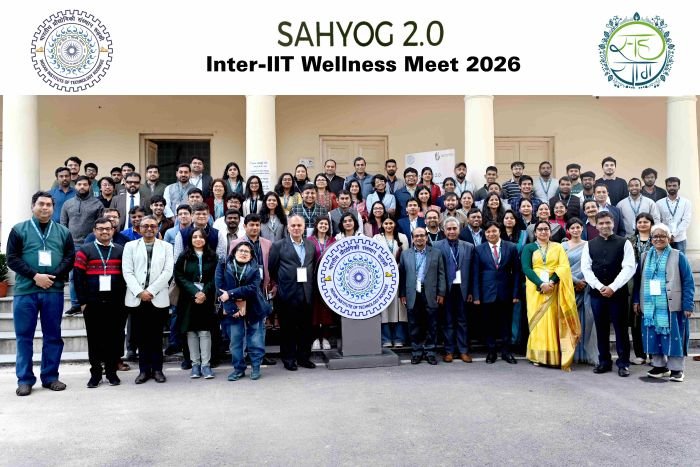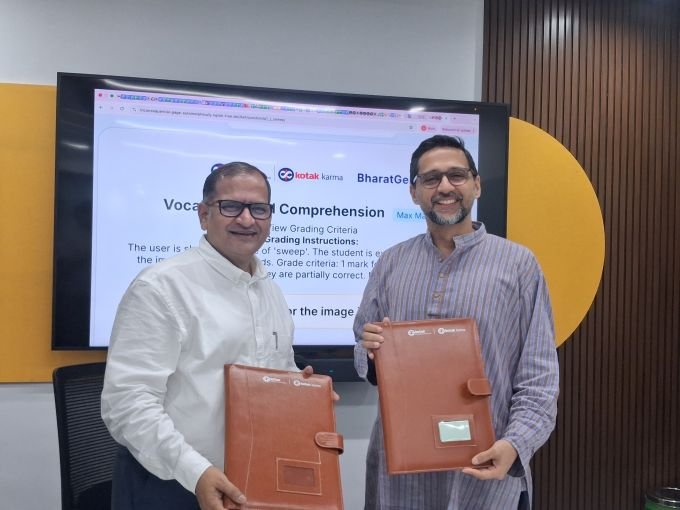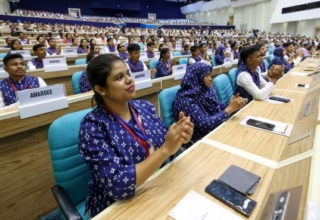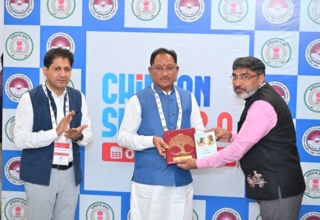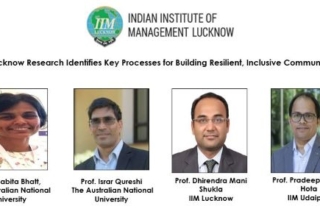
 Though this year’s budget proposals for education sector look like paying a closer attention than usual to this game changer sector and shifting focus on youth, in the ultimate analysis, education sector continues to remain a neglected priority for the government in this budget too
Though this year’s budget proposals for education sector look like paying a closer attention than usual to this game changer sector and shifting focus on youth, in the ultimate analysis, education sector continues to remain a neglected priority for the government in this budget too
Referring to the challenges of ambitions on growth, employment and social justice spelt in this year’s economy survey with a call for strengthening state capacity in delivering essential services , Kiran Bhatty, a Senior Fellow at the Centre for Policy Research, New Delhi and a Founder Member of the Forum for Deliberation on Education while writing recently in ‘The Wire’ argues that in the case of education, it is clear that the shortage in state capacity is linked not just to shortages in teaching staff, but also to infrastructure, reach of technology, administrative structures and systems. “But neither the Survey nor the Budget provide any indication of how these significant problems, especially those that are systemic in nature, are to be tackled,” she writes.
The Union Budget 2017-18 presented on February 1 this year as a departure from long practice of doing at on the last day of February has allocated an outlay of Rs79,685.95 crore (Rs46,356.25 for the school sector and the rest for higher education.) for the education sector for financial year 2017-18, up from Rs72,394 crore in 2016-17—a 9.9% rise, didn’t provide any clarity on addressing systemic challenges other than a few things here and there without much clarity or vision. The school assessment program has been allocated a sum of Rs 67 lakh in the 2017-18 budget as against Rs 5 crore in the previous one. Expense for conducting learning assessment in over 1.4 million schools with 250 million students with this money is very difficult. While the announcement of introducing a system of measuring annual learning outcomes in schools, is welcome but again it presupposes that the existing state of infrastructure and human resource pool in the primary education space across India is capable of ensuring a transparent, robust process of learning outcome assessment and further acting upon it.
“We know significant gaps exist in the delivery of education, infrastructure in schools, adoption of technology and latest methods of learning. Till these issues are addressed measuring learning outcomes will not be effective. This initiative has to be driven with adequate focus towards substantial investments towards upgrading the process of imparting education,” says Prateek Bhargava,CEO & Founder,Mindler.
The other provisions also look little. “National Education Mission” gets 29556 crores ,an increase of a little over Rs 1100 crores, most of this goes to Sarva Siksha Abhiyan (SSA), secondary education (Madhyamik Shiksha Abhiyan) gets an additional Rs 130 crores and teacher training another couple of hundred while the Ucchatar Shiksha Abhiyan gets no increase at all. In effect, no substantial financial resources has been made available to education sector in this budget.
“It would have been great if the FM would have spoken about the New Education Policy, Teachers training and announced measures for easy education loans,” feels Anil Pant, MD and CEO, Aptech Ltd. “Not all of India’s millions are required to become engineers, doctors or college professors. When you’re looking at employment for a working population of 860 million by 2020, radical approaches are required,” adds Bhargava.
Private sector, which plays a dominating role in technical education in the country and is a significant provider across various education segments right from K-12 also feels left out in this budget. According to Naveen Chopra, Founder & Chairman, The Chopras’, schools without teachers, static curriculums, capacity constraints across all sectors and huge leadership gaps stare us in the face and the government does absolutely nothing to inject freshness and energy in the sector. It does not tap into the huge talent and leadership pool available in the private education sector nor does it make any attempts to garner into its advisory panels on education, people who are thought leaders in the sector what is disappointing to note is the fact that embedded government and bureaucratic thinking still prevails as far as private sector’s role in the education arena is concerned. Expressing disappointment at no reference to private funding in education Shantanu Prakash, MD, Educomp Solutions Ltd says “opening up the education sector to FDi remains the single most potential step to revitalise education in India but the absence of any progress on that front means that the sector will continue to struggle for capital.”
However, at the same time there are some very good announcements to cheer about. The University Grants Commission (UGC) has finally received the attention that has been long overdue in terms of far reaching reforms in its structure, mandate and autonomy as an effective Higher Education regulator in the country. In his Budget Speech, the Finance Minister also said that colleges will be identified based on accreditation and ranking, and given autonomous status. A revised framework will be put in place for outcome based accreditation and credit based programmes. This will ensure that good quality institutions would be enabled to have greater administrative and academic autonomy.
According to Vijay K Thadani, Vice Chairman & Managing Director, NIIT Ltd. a specific statement on granting autonomy to higher education institutions based on performance shows that the government has its priorities right. “ Autonomy of educational institutes are essential for innovation in learning as well as research and hence the proposed reforms in UGC with a focus on accreditation and rankings are revolutionary steps that have the capability of transforming the higher education arena in the country, making it more globally competitive,” feels Prof. Vijaysekhar Chellaboina, Deputy Dean – Academics, Mahindra Ecole Centrale, Hyderabad.
Ravneet Pawha, Associate Vice President (Global Engagement), Deakin University, Australia is of the view that he budget is forward looking and innovative for the higher education sector, in India. Accreditation of universities and colleges will ensure autonomy and competitiveness in the education sector. However, this would require higher education institutions to scale up their academic infrastructure, which can be accelerated through partnering with global universities and adopting global practices. This will help them improve their rankings in India as well as globally.
The budget indicates some very encouraging signs of change, in particular, the introduction of a National Agency for Testing and Entrance Exams is a welcome initiative – long overdue. It will reduce the burden of students. “The proposal to launch National Testing Agency to conduct all major entrance examinations is a milestone. As Mr Jaitley pointed out, CBSE would now be relieved from the burden of conducting examinations and can henceforth focus on academics better. Besides that, this step would also free students from the burden of taking different entrance examinations. Last year, the hurried implementation of Eligibility cum Entrance Test (NEET) had left students confused over whether to follow the CBSE syllabus or not. This move would dispel all such confusions over syllabus in future,” says Beas Dev Ralhan,CEO & Co-founder, Next Education India Pvt. Ltd.
According to Amol Arora, Vice President, Early Childhood Association and promoter of SHEMROCK & SHEMFORD Group of Schools, it is good that the government has freed CBSE from other forms of assessments, because it was turning into a national assessment body which was overburdening it. CBSE should focus on researching better assessment & examination formats through which a child can be holistically evaluated. “And once we have a more holistic format for assessments, I’m sure teaching & learning in schools will change.”
However, experts caution that the present form of one single exam is not in-tune with the technology as well as the scientific developments happening in the field of testing. “There are more than 200 agencies in the world which are developing better and newer concepts of testing, so this agency should not be a traditional bureaucratic agency but a modern and forward-looking agency, “ says Dr. Sanjay Dhande, Chief Mentor, Avantika University. National Testing Agency should not only manage large scale tests, but should also have a research wing for research on testing like ETS in USA adds Prof. Dheeraj Sanghi, Dean of Academics, IIIT-Delhi.
Setting up the innovation fund for secondary education segment is also a welcome step. A positive sign is the approach of bottom-up, which is innovation and science being given importance from the secondary education level itself, this will surely help build design thinkers and creative workforce of the future comments Prof Dr Uday Salunkhe, Group Director, WeSchool in reaction to proposed Innovation Fund for Secondary Education with focus on 3479 educationally backward blocks. “We applaud the move towards ‘smart education’, with the introduction of an ‘innovation fund’ for the secondary education segment, geared towards harnessing technology,” days Sandy Hooda, Co-Founder, Vega School.
Announcement of 350 online courses on the Swayam platform is also a laudable attempt on the government’s part to further its ambitious Digital India initiative. Swayam was first talked about in 2014, and a pilot program started in August 2016. Jaitley said access to Swayam would be widened by linkage with DTH channels, dedicated to education. “we believe that government’s proposal to leverage information technology and launch SWAYAM is a great step forward to enhance learning for every student, says Naman Singhal, Co-Founder,3Dexter. Akshay Munjal, President BML Munjal University opines that the launch of the Swayam platform is significant throughout the country, particularly in Tier-2 and Tier-3 cities.
The budget allocation of Rs.2200 crore under the Skill Strengthening for Industrial Value Enhancement (STRIVE) in the next financial year 2017-18 with a focus on improving the quality and market relevance of vocational training and strengthening the apprenticeship programmes through industry cluster approach has been well received. Upon this the decision to set up 100 international skill centres to help youth with job opportunities is surely a welcome move. Ajay Chhangani, CEO & Co-Founder of RISE INDIA feels that allocation of 1.84 lacs crores for skill development for women is the biggest ever initiative on women empowerment taken by Government of India.
According to Pankaj Bansal ( Co-founder and CEO – PeopleStrong), special focus on implementation of skill strengthening with a budget of Rs 2200 cr and setting up of 100 India International skill centres across the country for the youth to seek jobs outside India is again a good step towards making Indian workforce a skilled workforce. “The Finance Minister has rightly shifted his focus on the youth as we stand as the nation with the largest youth population in the world with 356 million youth,” says Shekar Sanyal, Director and Country Head, the IET.
According to Dr. Narendra Shyamsukha, Founder Chairman, ICA Edu Skills, one big challenge that skill development faced till now was paucity of finances for creating awareness among youth and influencers, but with 4000 crore set aside for this project under the new budget things should look up. The next step should be to set up. International skill centres to groom skilled professional for global market. The additional focus on advanced skills development and preparing a global workforce through India International Skills Centres is a very welcome step says Thadani of NIIT adding that moreover setting up of Digi Gaon will open new vistas for technology based education for our rural folks.
But some experts aren’t impressed with singular emphasis on skills outside academics. Dr Dhande feels the discussion about separation of regular education and vocational training should not be treated separately. The fusion of vocational training in mainstream education is necessary. Hence, the investment in vocational training should be blended with the regular education of the student
Also, the edtech segment is somewhat disappointed as the budget is silent on how India will be made a world class education destination with campuses adopting AR/VR/NLP/AI solutions and services. “It is silent on sector based support to startups, “says Rishi Kapal, Global Strategist and CEO, EduGild adding that for the Edtech sector, we anticipated announcement where the government would open international centre’s to give global access to Indian edtech companies.
Another much-awaited move was the decision to set-up a centralised academic records repository to cut down on the fake certifications – which is due this year. In the budget this year, we expected the government to apprise the citizens on the status of the program. It would have been better if the government would have announced more statutory powers for National Board for Skills Assessment and Certification (NBSAC) and bring all certificates from ITIs and vocational training institutes under the purview of the programme says another industry expert.
But in the end, whatever has been provided must be seen on ground and Utpal Ghosh, CEO and President, UPES, University of Petroleum Energy Studies puts it this way, “What is important is a follow-up action in conceptualising and planning for the initiatives announced in this Budget. A big push is needed in the area of implementation. It is important that these initiatives gather momentum in this financial year.”
 Key Proposals
Key Proposals
Setting up of a National Testing Agency
Government proposes to establish a National Testing Agency as an autonomous and self-sustained premier testing organization to conduct all entrance examinations for higher education institutions. This would free CBSE, AICTE and other premier institutions from these administrative responsibilities so that they can focus more on academics.
National Testing Agency, the outlines of the structure and the tasks to be assigned have by and large been prepared and a proposal will shortly be prepared for processing. CBSE is presently being overburdened with conducting multiple examinations for about an estimated 1.12 Crore number of students over the year.
In the first instance best entrance examinations for streams of higher education, including the IITs, NITs and even university system would be prepared. It is hoped that later the Agency will move from being merely an examination body to one that is able to support education system. In other words, providing for including outcome learning and outcome assessments for students and in evolving good examination processes.
Reforms in the UGC
Government will undertake reforms in the UGC. Good quality institutions would be enabled to have greater administrative and academic autonomy. In his Budget Speech, the Finance Minister said that the colleges will be identified based on accreditation and ranking, and given autonomous status. A revised framework will be put in place for outcome based accreditation and credit based programmes.
Reforms in University Grants Commission, responding to a felt need to bring about great process efficiency and role clarity in the University Grants Commission, the Finance Minister’s Budget Speech has referred to reforms to be undertaken for the UGC. While the details and modalities of the reforms will be worked out over the next few months, the intended direction is to allow good quality institutions to be brought under a more liberal regulatory measure, initially with provisions for self regulations and peer review.
The UGC should focus more on improving quality and helping institutions which are presently of lesser quality to reach higher academic and educational standards. Graded oversight by the UGC depending on the nature of the institutions is one possibility with less oversight and regulation for good quality institutions and greater UGC guidance and handholding of lesser quality.
It is intended that a system be put in place for regular curriculum reform which would ensure that the intuitions upgrade their curriculum in consonance with the present day requirements to meet the challenges of the modern world.
A possible area of focus would be the Credit Based Qualification Framework to be framed with equivalence being determined on credit hours rather than calendar duration.
There is a need to focus on teacher education, including at the time of induction, and periodically, the latter in the form of refresher training.
Creating an innovation fund for secondary education
It is proposed to create innovative fund for secondary education for ensuring universal access, gender parity and quality improvement. Delivering his Budget Speech, the Finance Minister said this will include ICT enabled learning, transformation and the focus will be on 3479 educationally backward blocks.
The Innovation Fund for Secondary Education would be provided from the budget of Rashtriya Madhyamik Shiksha Abhiyan (RMSA) Scheme to encourage local innovation for ensuring universal access, gender parity and quality improvement, to be introduced in 3479 educationally backward blocks and Rs. 100 Crore have been earmarked for this in the Budget 2017-18. One time allocation would be made to the State/UT under the innovation Fund. The States/UTs would be required to submit a proposal in this regard. The proposals from States will need to include in their proposals innovation element, sustainability etc. A national level committee would be constituted which would be headed by the Additional Secretary- Department of School Education & Literacy, MHRD which would consider and approve the proposals under the Innovation Fund.
The proposals may include projects like:-
ICT enabled learning tablets/ smart classrooms/ virtual classrooms/ IT based teaching aids for CWSN.
Enrolment and retention drive for SC/ST/girls/minority students in EBBs.
Transport facilities for students in difficult areas in EBBs.
Portacabin residential schools in worst affected LWE districts.
Guidance and counseling for adolescent children.
Innovative science labs/ tinkering labs/ robotics labs.
Boys hostels in EBBs.
SWAYAM Platform with at least 350 online courses
Government proposes to leverage information technology and launch SWAYAM Platform with at least 350 online courses. The SWAYAM platform is ready, content is currently under review with the objective of making it more attractive for students and easier for them to absorb and learn content. The objective is to have a system of quality assurance for courses offered.
At the same time, a system for encouraging and preparing faculty of educational institutions to work in conjunction with the MOOCs and to use them in classroom teaching and in smaller students groups.
The credit framework being developed for the MOOCs too.
An outreach and awareness programme for SWAYAM and the DTH channels will be prepared to make them more acceptable to stakeholders.
MOOCs will be blended with Open and Distance Learning system, for better communication and learning structure as a platform of the future.
100 India International Skills Centres
Government proposes to extend the number of Pradhan Mantri Kaushal Kendras from current 60 to cover more than 600 districts across the country. He said 100 India International Skills Centres will be established across the country. These centres would offer advanced training and also courses in foreign languages. This will help those of our youth who seek job opportunities outside the country.
The Finance Minister Shri Arun Jaitley said that in the Financial Year 2017-18, a programme SANKALP (Skill Acquistion and Knowledge Awareness for Livelihood Promotion Programme) will also be launched at a cost of Rs. 4,000 crore. SANKALP will provide market relevant training to 3.5 crore youth.




